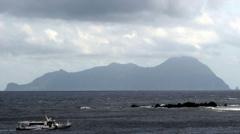The Wonsan Kalma resort, recently opened to Russian tourists, has raised serious concerns regarding human rights abuses during its construction.
North Korea's New Resort Welcomes First Russian Tourists Amid Concerns

North Korea's New Resort Welcomes First Russian Tourists Amid Concerns
Newly inaugurated Wonsan Kalma resort faces scrutiny over construction worker treatment.
The Wonsan Kalma resort in North Korea has opened its doors to its first group of Russian tourists, heralded as a "world-class tourist and cultural destination" by leader Kim Jong Un. However, as excitement mounts, the resort faces backlash from human rights groups citing the severe treatment of construction workers involved in its development.
This resort, located in Wonsan—a seaside town linked intimately with Kim Jong Un's youth—was built in a rush following Kim's visit to Spain to study beach resorts. North Korean officials projected aspirations of attracting a million tourists, albeit while maintaining the area as a closed zone. Satellite images reveal a flurry of construction along a 4km coastal stretch, with 80% of the project completed by the end of 2018. Nevertheless, reports indicate that construction practices may involve "shock brigades," workers coerced to endure harsh conditions with inadequate rest and recompense.
The UN has reported that forced labor is endemic to North Korea, and troubling accounts from defectors describe life-threatening pressures on workers to meet project timelines. One individual noted that the system behind "shock brigades" can leave workers physically depleted. Others, driven to work on the site for perceived benefits like residency in the capital, have similarly reported harsh living and working conditions.
Despite the challenges, a handful of Russian tourism agencies have initiated offers for trips to this new resort, although interest appears limited. Experts suggest that with superior destinations readily available, Wonsan Kalma may struggle to attract substantial tourist traffic. As international embassies monitor the situation, North Korea's ambitions to rejuvenate its economy via tourism remain fraught with questions surrounding ethics and human rights.
Prospects look uncertain with local residents displaced for development and ongoing scrutiny over labor practices. With tourism regulations shifting in this tightly-controlled state, the viability of Wonsan Kalma as a future destination remains to be seen.
This resort, located in Wonsan—a seaside town linked intimately with Kim Jong Un's youth—was built in a rush following Kim's visit to Spain to study beach resorts. North Korean officials projected aspirations of attracting a million tourists, albeit while maintaining the area as a closed zone. Satellite images reveal a flurry of construction along a 4km coastal stretch, with 80% of the project completed by the end of 2018. Nevertheless, reports indicate that construction practices may involve "shock brigades," workers coerced to endure harsh conditions with inadequate rest and recompense.
The UN has reported that forced labor is endemic to North Korea, and troubling accounts from defectors describe life-threatening pressures on workers to meet project timelines. One individual noted that the system behind "shock brigades" can leave workers physically depleted. Others, driven to work on the site for perceived benefits like residency in the capital, have similarly reported harsh living and working conditions.
Despite the challenges, a handful of Russian tourism agencies have initiated offers for trips to this new resort, although interest appears limited. Experts suggest that with superior destinations readily available, Wonsan Kalma may struggle to attract substantial tourist traffic. As international embassies monitor the situation, North Korea's ambitions to rejuvenate its economy via tourism remain fraught with questions surrounding ethics and human rights.
Prospects look uncertain with local residents displaced for development and ongoing scrutiny over labor practices. With tourism regulations shifting in this tightly-controlled state, the viability of Wonsan Kalma as a future destination remains to be seen.



















